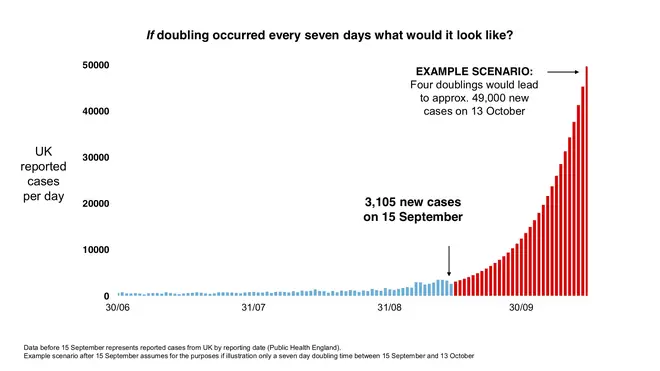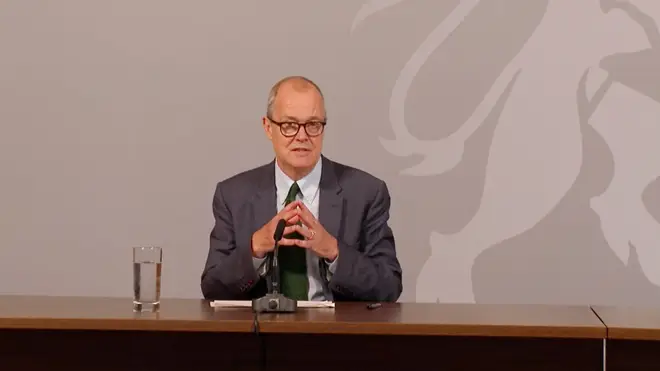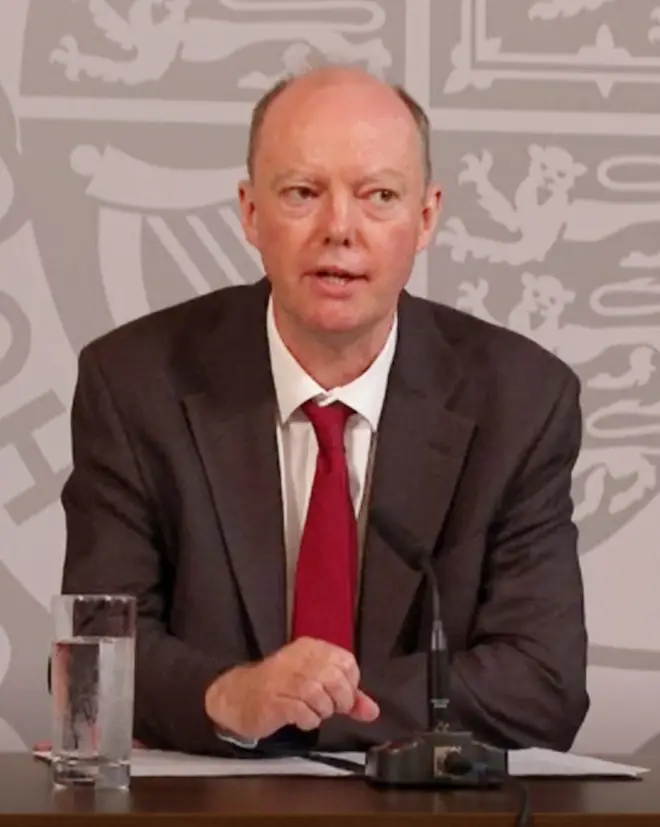
Ali Miraj 6pm - 9pm
21 September 2020, 11:12 | Updated: 21 September 2020, 11:51

Sir Patrick Vallance warns of nearly 50,000 cases per day in mid-October
The UK could see 200 Covid deaths a day by mid-November if the rise in cases continues at its current rate, the Chief Scientific Adviser has said.
Sir Patrick Vallance said at a Government press briefing that if cases continue to double each week, we could have 49,000 new infections per day by mid-October.
He said that this rise could lead to 200 deaths per day by mid-November.
Coronavirus Live: Whitty and Vallance give key pandemic update
Sir Patrick said although the graph is "not a prediction," it shows "how the virus could move" if the rise continues.
He also clarified that the rise in cases was not linked to an increase in testing, as it was the percentage of tests taken where the increase had been seen.

In a presentation of the latest coronavirus data, the Government's chief scientific adviser said: "At the moment we think the epidemic is doubling roughly every seven days.
"If, and that's quite a big if, but if that continues unabated and this grows doubling every seven days... if that continued you would end up with something like 50,000 cases in the middle of October per day.
"50,000 cases per day would be expected to lead a month later, so the middle of November say, to 200-plus deaths per day.
"The challenge therefore is to make sure the doubling time does not stay at seven days.
"There are already things in place which are expected to slow that, and to make sure that we do not enter this exponential growth and end up with the problems that you would predict as a result of that.
"That requires speed, it requires action and it requires and it requires enough in order to be able to bring that down."

He said "in every age group we've seen an increase", adding this is not due to more testing, because of an increase in test positivity and results of the ONS study, which says around 70,000 people in the UK have Covid-19.
Sir Patrick said: "The way that we reduce the spread is by limiting our number of contacts, by reducing contact in environments where spread is more likely - those are crowded environments, indoor environments, poor ventilation - and making sure that we reduce the probability of coming into contact with anyone who is infectious.
"And that's the importance of self-isolation, keeping out of circulation if you have, or may have, the virus."
Sir Patrick said the size of the UK population with antibodies was still low, making the "vast majority" of people "susceptible" to Covid-19.
Antibodies were not an "absolute protection" either, he said, with the immunity to the illness fading over time.
Speaking at the briefing, he said: "What we see is that something under 8% of the population have been infected as we measure the antibodies.

James O'Brien's instant reaction to Chris Whitty's speech
"So 8%, about three million or so people, may have been infected and have antibodies.
"It means the vast majority of us are not protected in any way and are susceptible to this disease."
He said antibodies in city populations was a "little higher" and that as many as 17% of people in London could have them, making the spread slower in those areas.
Chief medical officer Professor Chris Whitty told the briefing there was now "significant rates of transmission" of coronavirus in parts of the UK.
Referring to a presentation slide looking at the growth of Covid-19 outbreaks, he said: "What we've seen is a progression where, after the remarkable efforts which got the rates right down across the country, first we saw very small outbreaks, maybe associated with a workplace or another environment, then we've seen more localised outbreaks which have got larger over time, particularity in the cities.
"And now what we're seeing is a rate of increase across the great majority of the country.

"It is going at different rates but it is now increasing.
"And what we've found is, as we go through in time, anywhere that was falling is now moving over to beginning to rise and then the rate of rise continues in an upwards direction.
"So, this is not someone else's problem, this is all of our problem."
Professor Whitty hinted at curbs to social lives being needed to prevent coronavirus spiralling out of control.
"You cannot in an epidemic just take your own risk, unfortunately you're taking a risk on behalf of everybody else. It's important that we see this as something we have to do collectively," he said.
He said the four things to do are reducing individual risk by washing hands and using masks, quarantine measures, and investing in vaccines and drugs.
"The third one, and in many ways the most difficult, is that we have to break unnecessary links between households because that is the way in which this virus is transmitted," he said.
"And this means reducing social contacts whether they are at work, and this is where we have enormous gratitude to all the businesses for example who have worked so hard to make their environments Covid-secure to reduce the risk, and also in social environments.
"We all know we cannot do this without some significant downsides.
"This is a balance of risk between if we don't do enough the virus will take off - and at the moment that is the path we're clearly on - and if we do not change course we are going to find ourselves in a very difficult problem."